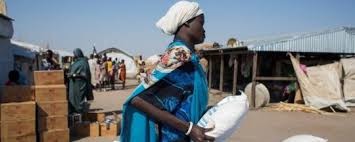The United Nations World Food Programme (WFP) said it has started to move food aid to reach famine-hit and food-insecure people in South Sudan by using a newly opened humanitarian corridor announced by the Sudanese government this week.
In February, the United Nations declared a famine in some parts of South Sudan, where some 5.5 million people face hunger.
The UN agency said Thursday the new route enables it to transport food assistance overland from El Obeid in central Sudan to Bentiu of Unity State in South Sudan.
“Today [Thursday], the first convoy of 27 trucks carrying an initial 1,200 metric tons of sorghum started moving at 15:00 hours from El Obeid in central Sudan towards Bentiu in South Sudan. The convoys will take 5 days to complete the 500km journey,” said WFP.
The organization further said it plans to deliver 11,000 metric tons of sorghum, including 1,000 metric tons donated by the government of Sudan in seven convoys of 30 to 40 trucks, adding that this is enough food to feed 300,000 people for three months.
“WFP would like to thank the Government of Sudan for acting decisively by opening this new corridor,” said WFP Sudan Representative and Country Director Matthew Hollingworth.
“This new route will allow WFP to regularly reach famine-affected people in South Sudan with food assistance and help to avert the consequences of starvation,” he added.
Following the eruption of violence in South Sudan in December 2013, WFP pointed out that it has been moving food assistance through a corridor linking White Nile State in Sudan with Upper Nile State in South Sudan.
“To date, thanks to an agreement first signed between Sudan and South Sudan in July 2014, WFP has moved over 57,420 metric tons of assorted commodities through this corridor into South Sudan,” it said.
WFP Sudan further said it assisting over 250,000 South Sudanese refugees across Sudan, mainly in White Nile State.
Throughout 2017, WFP revealed that plans to assist more than four million vulnerable people in Sudan, including internally displaced people, refugees, people affected by climate change, and host communities.
“WFP provides such support through a range of activities, including emergency food assistance, cash-based transfers (or vouchers), nutritional support, and resilience-building activities to help communities become increasingly independent,” it explained.
Photo: South Sudanese mother carries a bag of cereals provided by the WFP in in El Alagaya refugee camp in White Nile state (Ala Kheir/WFP)




